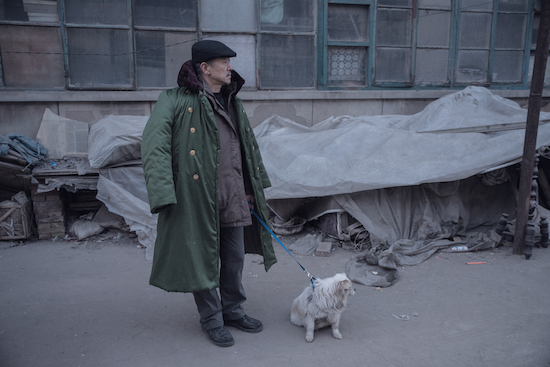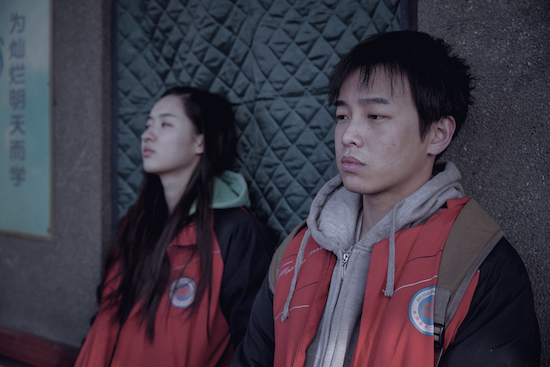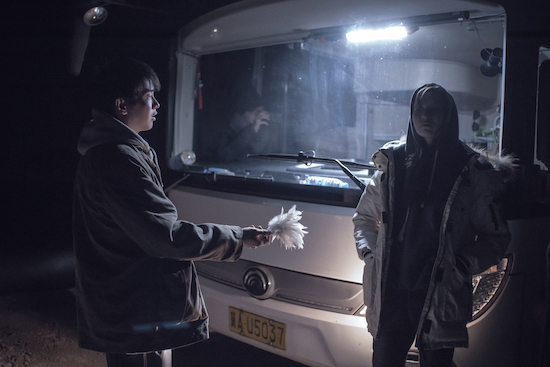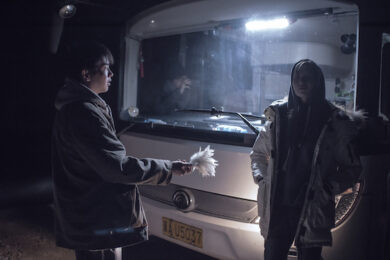On October 8th 2017, the director and novelist Hu Bo met a friend for a drink in the Wangjing subdistrict of Beijing. The two talked and drank all night and deep into the morning, discoursing on everything from the slow cinema of Béla Tarr to Hu’s thoughts on the character of Colonel Aureliano Buendía in Gabriel Garcia Marquez’s novel One Hundred Years of Solitude.
In that novel, Aureliano is a great artist, a metalsmith of the highest order – a crafter of exquisite golden fish, whose life is marred by tragedies whose cumulative effect combine to make him emotionally numb. Eventually Aureliano attempts suicide in a fit of disillusionment and despair: a great artist who has stopped creating entirely, who comes to wish only for the nothingness of the grave.
During the course of their conversation Hu reportedly remarked to his friend that when he died he wanted an image of a hanged man to be engraved on his tombstone. His friend, thinking he was joking, replied “surely the words accompanying the hanged man would be ‘the loneliest man in the world!’” To which Hu’s ashen riposte was that “there’s not much to life really, besides my being a tool that only ever writes, and makes films. Creation demands impossible rubrics of pain.” Four days later, Hu Bo killed himself.
Hu was found on 12 October hanging by the neck in the stairwell of his Beijing apartment building, dead at age 29. He had recently completed what was to be both his first and last feature film, An Elephant Sitting Still, a four-hour opus that feels like the cinematic equivalent of a suicide note, penned with the rage and despair of an entire generation of young Chinese struggling and dying under their country’s brutal march towards capitalist ‘modernization.’
Forged in a social-realist mode, An Elephant Sitting Still’s aesthetic modality is characteristic of one that reemerged in China in an oppositional context, as a rejoinder to the bastardization of the form during the period of the Cultural Revolution. During that period, social-realist aesthetics were pressed into the service of a ‘Socialist-Realist’ cinema that was more interested in hewing to party ideology than engaging with the reality of life for normal Chinese people. Slotting legibly into the constellation of suffering, anarchy, political violence, cruelty, and neglect that manifests in much of today’s independent Chinese cinema, Hu’s film feels inspired by the works of Sixth Generation filmmakers such Jia Zhangke and Zhang Yuan in the keen attention it pays to the grinding poverty and terrifying social atomization that has accompanied China’s recent economic rise and rapid urbanization. The film’s cinematography by Fan Chao has a documentary-like intimacy (with its long takes and tracking shots) that when considered in accordance with its subject matter is reminiscent of work from China’s New Documentary Movement; where filmmakers such as Wu Wenguang, Kang Jianning, Jian Yue, and more recently Zhao Liang, Huang Weikai, and Wang Bing have committed themselves to thoroughly documenting China’s socio-political maladies in ways that are fundamentally in opposition to the state.
The characters of An Elephant Sitting Still struggle against corruption, poverty, and the total lack of anything resembling a social safety net; and yet the deepest rot eating away at Chinese society in the film is operating on a moral register. Almost every human relationship in Hu’s film is poisoned. The family unit is portrayed as little more than a spiraling nexus of dysfunction, the state apparatus is either openly abusive or entirely absent; and one’s only possible course of action in any given encounter is generally dictated by whatever is worst and most base in man’s nature. It is a world built around a single precept: homo homini lupus. Man is wolf to man.

Hu’s depicts a China in a state of freefall; a universe of scavengers and hustlers, full of traumatized people who have been beaten down and defeated by decades of abuse and neglect. Everyone in Hu’s world is either already dead or despondent, shuffling between downbeat rage and simmering frustration with the status quo. This is a fallen world, where trash fires burn and rabid dogs roam the streets. The depressive fugue Hu establishes extends even to the physicality of his film, over which a fatalistic pallor always hangs. The sky of the unnamed town where the action takes place is a constant wan grey, giving the impression that even the sun itself has fled from the bleached and decrepit industrial zone he depicts.
All of this, as we are told by several characters throughout the course of the film, is just the normal order of things. In one particularly horrifying passage, a man relays a story from his youth about how he once chanced upon the sight of a classmate beating a stray cat to death with a rock. “The kid was bullied and told he had no future, but this had nothing to do with him killing the cat. He was just happy doing it.” When his interlocutor asks if he saw the incident as it was unfolding, he replies “Yes. I wanted to stop him. That was the right thing to do. But if I did I would have had something to do with it, so I just watched. I have to admit that I enjoyed watching the whole thing.” When pressed on why he would even tell such a sickening story, he reveals the moral undergirding the madness: “I want you to know that daily routines have been the same across the ages… life just won’t get better. It’s all about agony. Agony that began since before you were born.”
In another sequence involving the death of an animal, a man has his dog attacked and killed. When he confronts the owners of the dog that killed his own, asking them to take responsibility for the actions of their animal, they aggressively refuse to. They won’t even acknowledge his pain. Refusing to meet him on any moral ground whatsoever, they immediately assume he is trying to blackmail them, turning a conversation about moral responsibility into one about financial exchange. It is one of the most uncomfortable and distressing scenes in the entire film because of what it says about the crestfallen moral universe Hu has established, when a demand for responsibility, for a recognition of one’s elemental humanity, can be so directly dismissed: when a dog-eat-dog world becomes real.
The film opens with a suicide, as local gangster Yang Cheng (Zhang Yu) watches his best friend jump out of a window after discovering Yang in bed with his girlfriend. Elsewhere in town Wei Bu (Peng Yuchang) gets into a fight with a bully at school and accidentally ends up pushing him down the stairs to his death. Wei Bu’s schoolmate, Huang Ling (Wang Yuwen) gets into an argument with her mother after she finds out that Wei has been having an affair with the married vice-dean of her school; and Wang Jin (Liu Congxi), a pensioner, has to deal with an ungrateful family who want to send him off to a nursing home so that they can have more room for themselves in a new apartment.
As the film progresses, each of these characters hear of a story concerning the neighboring village of Manzhouli, where it is said there sits an elephant at a circus that is completely oblivious to the world. The story goes that this elephant sits motionless, in total contemplation, looking completely inward. A solemn and godlike beast, it has seemingly ascended to a higher plane of being, achieving a state of pure detachment by turning its face away from the world entirely, managing somehow to absent itself from existence while still actually being alive.
The titular elephant sitting still becomes a sort of existential lodestar for the film’s protagonists, drawing them towards Manzhouli. That the only sliver of hope Hu allows his characters to experience comes in the form of the pilgrimage they eventually make to see this elephant – a glorified god of unalloyed indifference – shows just how elementally worthless he considered life to be. When the only hope for happiness is to learn how to fully disengage, to embrace a pure living oblivion, to become like the elephant of Manzhouli, it might be better to simply die.
On July 26th of 2017 Hu posted on his Weibo account that “all these years, I had never thought about what cinema really was. It is humiliation, hopelessness, helplessness, a joke.” The production of his film was a troubled one, as producers Wang Xiaoshuai (a noted independent filmmaker himself) and his wife Liu Ye, demanded that he cut An Elephant Sitting Still down by half, from four hours to two. Hu bitterly resisted but eventually acquiesced under duress, aiding in a mangling of his own work that he was not at all comfortable with. Eventually, he reached out to famed Taiwanese editor Liao Ching-Song, known in the West for his work on the films of Hou Hsiao-Hsien, who encouraged him, speaking positively of the original four-hour version of his film. Hu was also creatively buoyed after attending a filmmaking seminar in Xining, where he had the opportunity to meet his directorial idol Béla Tarr, who reportedly enjoyed the short film Hu screened for him.
Returning to Beijing from the Xining seminar with Tarr, it seemed Hu’s mental state had improved. He began to busy himself with publishing a new novel, and had even managed to secure funding for his next film project, which was to be titled The Gate of Paradise. Even so, the legal disputes that arose from the contentious production of An Elephant Sitting Still took a serious toll on him. After his death, a document on his computer titled “The Death of a Young Director” was found, in which Hu outlines in detail the creative and financial disputes he had with Xiaoshuai and Ye. Only after Hu killed himself did the producers relinquish the film rights to his parents, who had it released in the version their son originally intended. In the cruelest of ironies, it was only Hu’s death that allowed An Elephant Sitting Still to survive.

In his novel Journey to the End of the Night Louis-Ferdinand Céline writes that “perhaps what we seek throughout life” is really “the greatest possible sorrow, so as to become fully ourselves before dying.” It’s a passage that I keep returning to when considering Hu’s film, which seems to me so fully formed, so incredibly accomplished, so freighted with agony, and so irrevocably final. An Elephant Sitting Still is a despairing snapshot of the mind of an incredible artist whose life was cut too short but who could never have created such art were things to have been any different. How does one critically engage with such material? With this sustained vision of the world as wasteland?
Hu’s father gave an interview to a reporter at a Chinese publication and was quoted as saying that he had watched his son’s film at least four times and still couldn’t understand why none of the characters in it ever laugh; and yet the existential despair at the core of Hu’s art does not seem all that complex to me. It’s just sad, that’s all. Hu believed the world was immutable, that nothing could, or would ever change. He believed that the way he saw the world when he made his film, and when he took his own life, was as it always would be. It’s why his film is so monumentally tragic and so profoundly heartrending. It’s why when Hu lets in a sliver of light towards the end of his film it is merely to beckon his characters towards a way in which they can learn to bear the pain of existence, not to change the world that produces such pain. Hu had no illusions that the world would ever stop spinning, just that he would no longer be able to feel it move beneath his feet. The elephant of the Manzhouli circus has ultimately answered the only question about life that the characters in the film – and one suspects Hu himself – believed to even be worth posing: how to make the pain stop.
An Elephant Sitting Still is at UK cinemas now



